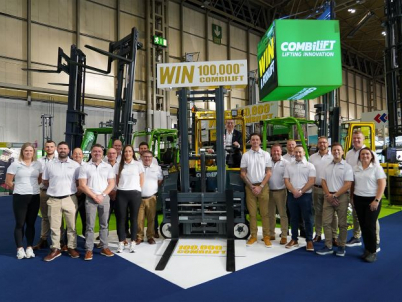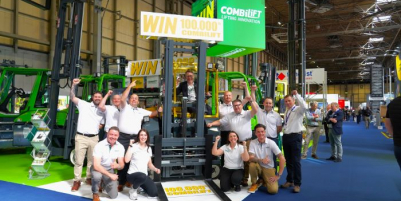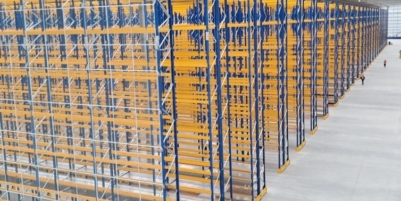-
Rite-Hite unveils new range of hydraulic kits to upgrade and extend dock leveller performance - February 19, 2026
-
REWE and Cimcorp automate fresh supply chain for Berlin supermarkets and stores - February 19, 2026
-
Q1 – A recovery period or time to fix, switch and scale? - February 19, 2026
-
NULOGY’S SHOP FLOOR SOFTWARE TO POWER COMPLETE CO-PACKING’SOPERATIONS - February 13, 2026
-
Why lead generation depends upon good content - February 13, 2026
-
Wallapop and Albatross Sign Strategic Partnership to Bring Real-Time AI Discovery to the Future of Consumer-to-Consumer Commerce - February 12, 2026
-
Thorworld ramp helps Hubergroup to streamline its unloading operation - February 6, 2026
-
TRACKER INNOVATION FROM QUECLINK TO BOOST STOLEN VEHICLE RECOVERY PERFORMANCE - February 4, 2026
-
Flexi Narrow Aisle hits 50! - January 29, 2026
-
DERRY BROS ATTRACTS RECORD NUMBERS OF FREIGHT CUSTOMERS SEEKING CUSTOMS SUPPORT - January 29, 2026
Nearly a quarter of all Toyota electric-powered forklift trucks ordered for delivery in the UK now feature Lithium-Ion battery (LiB) technology.
“While lead acid remains by far the dominant battery type within the electric-powered forklift market, sales of Lithium-ion forklifts have been on a sustained upward curve for some time,” says Gary Ison, Sales Training & Product Development Manager at Toyota Material Handling UK.
He continues: “Lead acid batteries have been a highly capable forklift power solution for years, and it is estimated that in the region of 90 per cent of all electric forklifts in operation throughout the world are still running on these battery types. But Lithium-ion battery technology is now seen as the next evolution in forklift efficiency.”
Lithium-ion’s share of the electric forklift market is widely expected to proliferate significantly over the next five years with a report recently undertaken by India-based analysts, Research Dive, forecasting that the global Lithium-ion forklift battery market will be worth close to $1,400,000 by 2026.
Gary Ison says: “Over the last decade or so, electric-powered forklifts have become an increasingly popular choice for businesses across all industry sectors who find themselves under growing social and legislative pressure to operate in as environmentally sensitive way as they can.
“Traditionally, electric lift trucks have relied on lead-acid battery technology but the Lithium-Ion solution has now become well established as a viable alternative. Today, in the right applications, Lithium-ion is revolutionising the way some companies operate their intralogistics processes.”
Growth in the LiB-powered forklift market is being driven by a number of factors, not the least of which are the energy efficiency benefits and savings on fleet running costs that Lithium-ion offers.
But of equal significance are the advances in both battery and charger technology that have alleviated the health and safety issues that, for a while, were linked with LiB following a number of high profile fires at industrial buildings reportedly started by malfunctioning Lithium-ion batteries.
“There is no doubt that, some of the problems experienced by the early adopters of LIB technology made people cautious, but the science has moved on and it is easy to understand why more and more electric truck users are interested in Lithium-ion,” says Gary Ison.
He continues: “Lithium-ion batteries have the ability to be recharged in as little as one hour – which increases a truck’s overall availability. One hour’s charging will give in the region of 4 to 5 hours of operating time. Also, as these batteries allow for opportunity charging, trucks can be recharged anywhere by the operator during breaks in a shift or other periods of downtime. As a result, there is no need to swap batteries – so dedicated charging rooms and spare batteries aren’t necessary.”
Lithium-ion’s quick and easy opportunity charging functionality means that LiB fleets are most beneficial at sites where trucks are working at high intensity over multiple shifts or extended periods.
“Lithium-ion’s suitability as a power source for lift trucks is not driven by the number of forklifts in operation at a site but by the intensity of their schedule. A company that runs one reach truck 24 hours-a-day will benefit from switching to LiB while a facility with a dozen machines that are used for light duties from 9-to-5 would commercially probably still be better served by trucks powered by lead acid batteries,”explains Gary Ison.
“But,” he cautions, “at any multi-shift operation with a high number of trucks working it is essential to manage and schedule operator break periods and consider the scenario where several trucks are ‘plugged in’ for recharging at the same time.
“This is because during the shorter ‘opportunity’ recharging process a LiB can draw down up to four times the power from the National Grid than that which is needed to charge a traditional lead-acid battery over 8 – 12 hours.
Gary Ison continues: “If charging schedules are not properly managed and too many LiBs are on charge at the same time there is risk that a building’s power supply could be overloaded.
“At Toyota we advise customers considering switching to Lithium-ion to speak to their utilities provider to flag up any potential power supply issues from the outset. But good charging discipline will deliver the consistent power levels required to allow the trucks to work around the clock – even within the most demanding environments.”
“At Toyota we employ bespoke simulation software that enables us to consider all aspects of a client’s operation from the outset and model the optimum choice of battery and battery charging regime for any facility. From there we can advise on power requirements and help customers considering switching to LiB to look at the bigger picture when assessing LiB’s suitability for an application.
“So, if you are considering switching to Lithium-ion, make sure your MHE supplier really understands your business and undertakes a thorough survey of your handling operation as well as – most importantly – the infrastructure of your site.
“With Lithium-ion offering so many benefits it is easy to forget that, for some users, the traditional lead acid battery will still represent the best option. Our pride in the Toyota brand means that we will always provide the right power solution for every electric truck application. It doesn’t matter if it’s Lithium-ion or lead acid – as long as it’s right for the customer.”
New reach truck models are Lithium-ion ready
The first three models in Toyota’s recenlty launched BT Reflex family of reach trucks– the high-performance R-series, the E-series (which features Toyota’s iconic and unique tilting cab) and the flexible O-series for inside and outside use – are all Lithium-ion ready.
The new trucks come with a choice of three intelligent energy packages to suit every customer’s application requirements: a 300 amp/hour battery for lighter duties; a 420 amp/hour battery for medium intensity work;and a 630 amp/hour solution for high intensity workhorses. All three packages are based on Toyota’s own modular Lithium-ion battery system and deliver a high degree of operational flexibility.

































